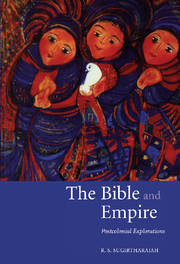Book contents
- Frontmatter
- Contents
- Acknowledgements
- Introduction
- 1 Textually conjoined twins: Rammohun Roy and Thomas Jefferson and their Bibles
- 2 Salvos from the Victorian pulpit: conscription of texts by Victorian preachers during the Indian rebellion of 1857
- 3 Thorns in the crown: the subversive and complicit hermeneutics of John Colenso of Natal and James Long of Bengal
- 4 Texts and Testament: the Hebrew scriptures in colonial context
- 5 Imperial fictions and biblical narratives: entertainment and exegesis in colonial novels
- Afterword
- Select bibliography
- Index of biblical references
- Index of names and subjects
4 - Texts and Testament: the Hebrew scriptures in colonial context
Published online by Cambridge University Press: 02 December 2009
- Frontmatter
- Contents
- Acknowledgements
- Introduction
- 1 Textually conjoined twins: Rammohun Roy and Thomas Jefferson and their Bibles
- 2 Salvos from the Victorian pulpit: conscription of texts by Victorian preachers during the Indian rebellion of 1857
- 3 Thorns in the crown: the subversive and complicit hermeneutics of John Colenso of Natal and James Long of Bengal
- 4 Texts and Testament: the Hebrew scriptures in colonial context
- 5 Imperial fictions and biblical narratives: entertainment and exegesis in colonial novels
- Afterword
- Select bibliography
- Index of biblical references
- Index of names and subjects
Summary
The Manusmriti, the Old Testament, and scores of other holy texts could do with judicious editing and interpretation.
David DavidarIn truth, the Jew does not walk from the Old Testament to the New. What was done was that the Christian walked backwards from the New Testament to the Old.
P. ChenchiahWhen a Christian from Manchester asked Gandhi to read the Bible, he accepted his advice and got himself a copy. This is how Gandhi recollected his experience:
I began reading it, but I could not possibly read through the Old Testament. I read the book of Genesis, and the chapters that followed invariably sent me to sleep. But just for the sake of being able to say that I had read it, I plodded through the other books with much difficulty and without the least interest or understanding. I disliked reading the Book of Numbers. But the New Testament produced a different impression, especially the Sermon on the Mount which went straight to my heart. I compared it with the Gita.
Godfrey E. Phillips, in his enquiry into the use of the Old Testament in the mission field, captures another example of this uneasiness about the Old Testament, this time experienced by a Chinese Christian:
Intending missionaries or evangelists waste their time if they spend a lot of it studying the Old Testament. It would be better for them to spend the time on Sociology or Psychology … The Old Testament teaching given in theological colleges in China is, in the experience of most of the students, devoid of interest or value for their after work. […]
- Type
- Chapter
- Information
- The Bible and EmpirePostcolonial Explorations, pp. 145 - 191Publisher: Cambridge University PressPrint publication year: 2005

